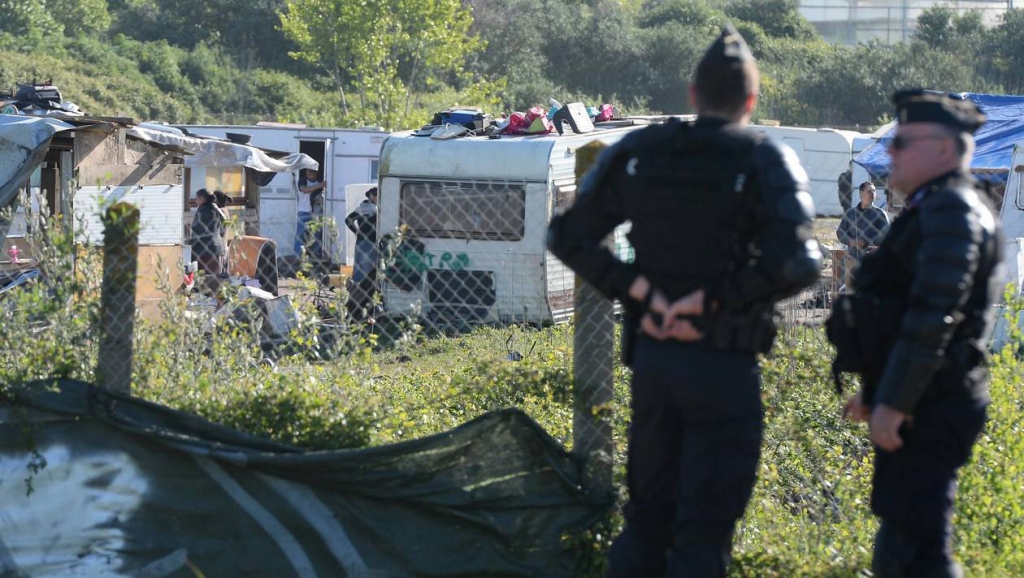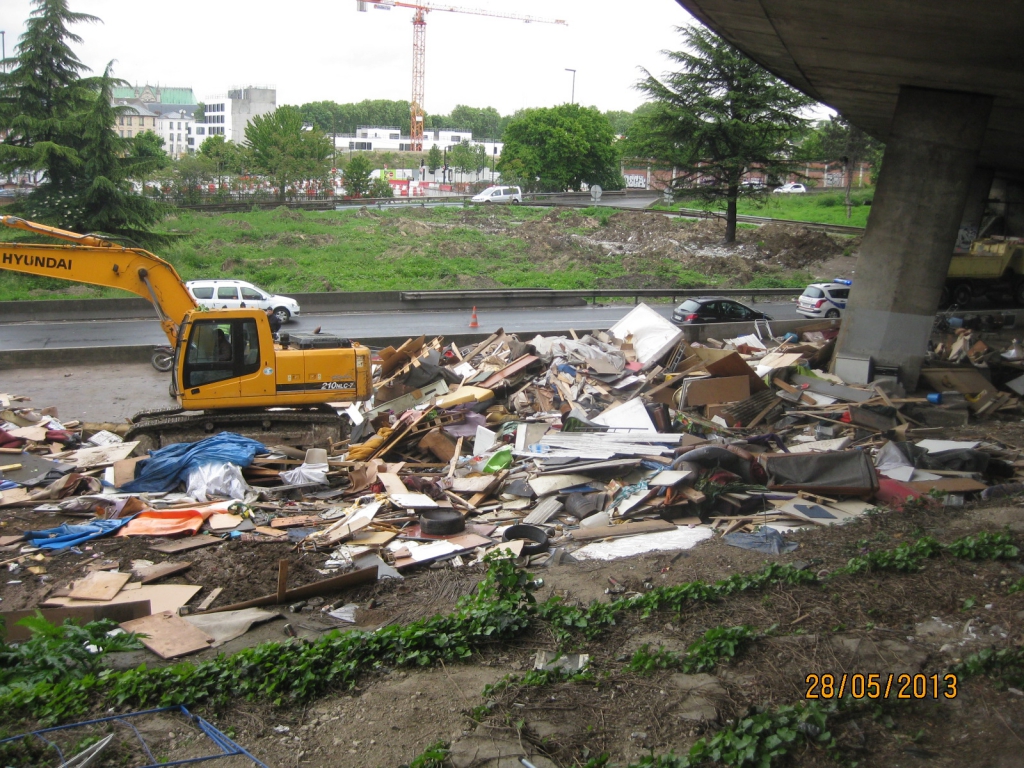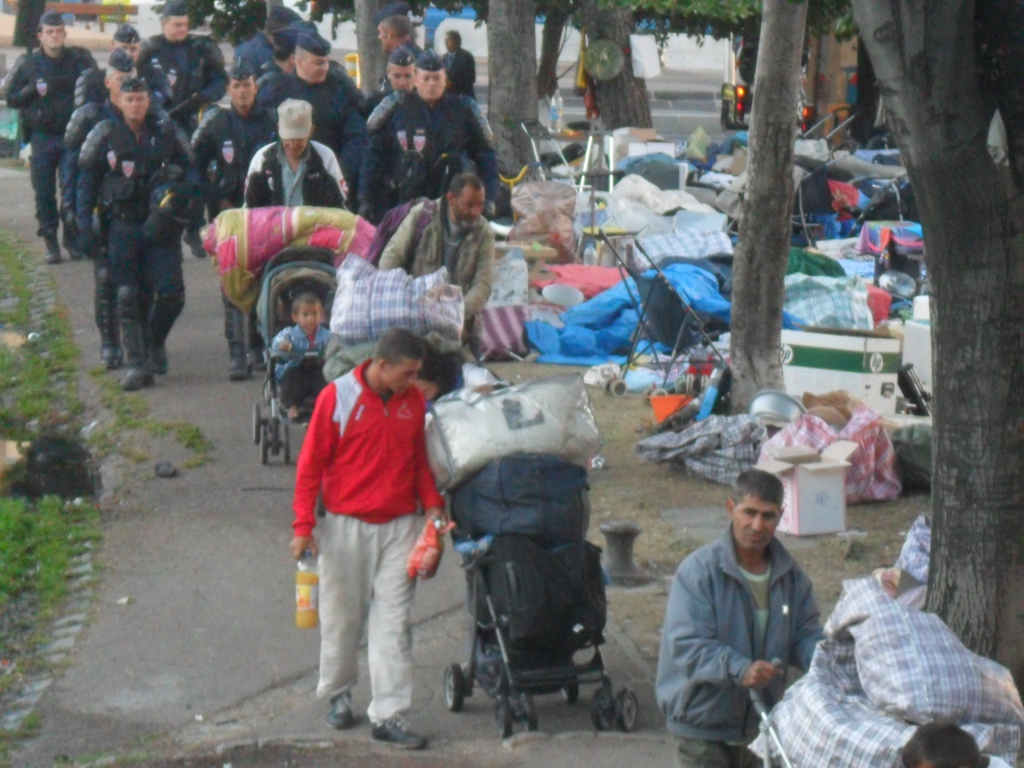The French recipe: evict, demolish and “deliver them back to the borders”
09 January 2020

France’s long cherished self-image as the source of enlightenment, and the republic as embodying “the moral ideal of the world” (Michelet), has taken something of a battering since 2010, not least due to its scandalous treatment of Roma. A state policy of collective punishment effectively kicked off with President Sarkozy’s declared intent in 2010 to raze Roma camps to the ground and deport Roma en masse back to Romania and Bulgaria.
The inflammatory rhetoric was followed by punitive policy measures and the deliberate infliction of hardship upon Roma through forced evictions and deportations. The extraordinary kerfuffle created by the authorities about Roma was by any standards extraordinary when one considers that in a country of 66.3 million inhabitants, the ‘migrant’ Roma never amounted to more than 20,000 people. Rather than invest in strategic Roma inclusion policies, France chose the repressive option, one which duly proved to be both futile and toxic.1
Before Sarkozy
However, maltreatment of Roma and Travellers in France long predates the Sarkozy excesses. More recently, back in 2005, the ERRC warned of a crisis facing Travellers and Romani migrants in France, where they were driven from municipality to municipality, subject to police harassment, brutality and mass expulsion by a combination of laws, policies and practices. The ERRC 2005 report, Always Somewhere Else: Anti-Gypsyism in France, found that
“While the indivisible Republic proclaims equality before the law for all citizens without distinction, Roma and Travellers experience a reality driven by racism that has resulted in them being treated as sub-citizens, subject to racial discrimination, rejection, repression and assimilation.” 2
On the issue of hate speech, the report cited the contribution of Senator Dominique Leclerc, who was widely applauded in a 2002 Senate debate when he described Travellers “as the plague of tomorrow”, bearing “extraordinary pathologies” and stated “They are anti-social people who have no respect for private property, no references, and for whom the words we use have no meaning.”
Travellers reported that police officers often taunted them during violent raids by saying, “It is too bad Hitler did not finish his work.” Mr M.C. described one such raid to the ERRC:
“They took out their guns and threatened us with tear-gas. They saw my five-month-old son sleeping in the crib. One of the police officers asked his female colleague to come and said ‘It is at that age that you have to put a bullet through them’ and laughed … the police escorted us until we were outside of the municipality. They followed us to be sure that we left.”
A municipal councillor from the Department of Seine-et-Marne told the ERRC how Travellers were scapegoated, and cited one mayor who boasted that he systematically refused to enrol Traveller children in the town schools, and that he rented fallow land to private individuals so that any Travellers who halted there could more easily be expelled from the municipality. He described how officials covertly created local citizens’ associations to wage protests against the creation of halting areas and the presence of Travellers in their town.
Most of the repressive measures targeted French nationals, and policymakers were particularly creative in finding ways to single out Travellers and Roma for negative treatment without being explicitly racist. Laws and policies did not explicitly target an ethnic or cultural group, but rather a “way of life.”
The French authorities, refuted ECRI and ERRC allegations of human rights abuses in the 21st Century, cited Article 1 of the 1789 Declaration of the Rights of Man and the Citizen, and without the slightest hint of irony declared that:
“The French Republican structure is founded on a social pact which transcends all differences and to which every individual can willingly adhere, whatever his or her biological characteristics or personal convictions. It follows that the legal concept of “minority” does not exist in French law … any approach that attempts to introduce quotas or recognize communities within society in defiance of the principle that all persons are equal before the law is unambiguously rejected.”
So, long before the ‘Sarkozy surge’ in 2010, Travellers and Roma faced institutional discrimination, direct racism, police harassment and collective punishment. In the European Union, the plight of French Travellers and Roma in France had for far too long been a case of eyes wide shut. Sarkozy’s opportunistic scapegoating of Roma ramped up the persecution; but it also had the unintended consequence of exposing the unsavoury side of France to the glare of global media. Roma suddenly found themselves the targets of the most punitive action by any French government since World War II.

The New Wave of Roma repression: collective punishment, mass evictions and ‘voluntary’ deportations
Struggling in the opinion polls, and with his government and ruling party dogged by financial scandal, Sarkozy took this opportunity to divert attention from his own failings by turning on a vulnerable and visible minority. While round-ups and deportations were already underway, the President’s rhetoric in singling out one ethnic group for blame and punishment, marked what an opposition MP called “the death of the Republic”.
16 July 2010: Riots in the village of Saint-Aignan by Gens du Voyage after a 22-year-old French Traveller was shot and killed by police during a car chase, provided French President Nicolas Sarkozy with a pretext to launch a series of measures directly targeting Bulgarian and Romanian Roma. He also stepped up harassment of Gens du Voyage. In addition to expulsions and the destruction of camps, a squad of tax inspectors was set up to target the owners of "caravans pulled by certain powerful cars".
30 July 2010: Sarkozy made a speech in Grenoble condemning anti-police demonstrations and vowed to "put an end to the wild squatting and camping of the Roma". As president, he could not accept the fact that there were 539 Romani camps in his country, and he promised that half of them would be gone within three months.
As Spiegel Online reported, Sarkozy was merely ratcheting up already-existing policies. Almost 10,000 Roma were expelled in 2009, and 8,500 in the year before that. Between the beginning of 2010 and Sarkozy's July speech, 24 charter flights loaded with Roma had already been flown to Romania and Bulgaria. According to the official account, the Roma were leaving the country voluntarily, because they had been pressured into signing a piece of paper and had been given €300 ($389) in compensation. However, the Grenoble speech “revealed a dramatic sharpening of the rhetoric.”3
7 August 2010: The first camp clearance took place in Saint-Etiennne, when French police sealed off the area around the camp, preventing journalists and rights groups from seeing the evictions, which began before dawn and continued for several hours. Afterwards, police said 44 of the camp's residents were ordered to leave France, with 10 adults and eight minors voluntarily agreeing to leave. The Loire regional prefect told journalists: "It is clear what I did this morning was in line with presidential instructions. There have been recent instructions to ask Roma to return home. There is no future here for Roma whose papers are not in order."
19 August 2010: Der Speigel reported that a charter flight carrying 93 recently evicted Roma took off for Bucharest. Interior Minister Brice Hortefeux, trumpeted: "We have closed down 40 illegal camps in the last two weeks." He said that 700 evictees would be sent back to their "countries of origin" within weeks. By 22 August, the government reported it had eliminated 88 Roma camps. As Ullrich Fichtner wrote:
“Now the government has taken to releasing counts representing the corresponding numbers of foreigners in those camps, a practice that hasn't been used in France since the 1940s, resulting in official statements to the effect that 700 Romanians were "evacuated" from one location, 160 Bulgarians from another and 130 Roma from yet another camp.” 4
Critics from within Sarkozy’s own party described the policy as ‘shocking’. Jean-Pierre Grand even said the arrests recall the mass incarcerations of French Roma during the Nazi occupation, who were kept in internment camps for two years after the liberation, and was upset "that families have been split up by security personnel -- on one side the men, on the other the women, and they are threatened with being split up from their children."
9 September 2010: The European Parliament passed a resolution calling for an immediate suspension of all expulsions of Roma, and “rejected any statements which link minorities and immigration with criminality and create discriminatory stereotypes as well as the inflammatory and openly discriminatory rhetoric lending credibility to racist statements and the actions of extreme right-wing groups".
14 September 2010: EU Justice Commissioner Viviane Reding provoked outrage from the French government when she branded the expulsions "a disgrace", accused French ministers of duplicity, and described the situation as one she thought that “Europe would not have to witness again after the Second World War".
Reding’s suggestion that the Commission might take legal action was prompted a leaked memo from the interior ministry, which showed that the French authorities had been instructed to specifically target Roma camps, contrary to assurances given by French ministers to the European Commission that there was no racial targeting.
The leaked file dated 5 August, sent from the Interior Ministry to regional police chiefs, included the instruction: "Three hundred camps or illegal settlements must be cleared within three months, Roma camps are a priority". Reding, furious at have been lied to, stated: "This is not a minor offence in a situation of this importance. After 11 years of experience in the Commission, I even go further: this is a disgrace."
16 September 2010: For the first time in recent memory, the issue of Roma exclusion had become one of bitter contention between EU Member States. Sarkozy’s spite and racism had the unintended consequence of forcing Europe’s most powerful leaders to recognise and face the reality of anti-Roma racism like never before.
The 2010 EU Summit was overshadowed by the unprecedented dispute between the French government and the EU Commission.5 Nicolas Sarkozy slammed Reding, saying "The disgusting and shameful words that were used - World War II, the evocation of the Jews - was something that shocked us deeply". Sarkozy told Luxembourg to take in France's unwanted Roma, and affirmed that his government would continue with its policy. Luxembourg’s Foreign Minister described Sarkozy’s suggestion that Viviane Reding's country of origin, Luxembourg, could accommodate the expelled Roma as "malevolent".
European Commission head, Barroso distanced himself from Reding's comments, but affirmed that "The prohibition of discrimination based on racial and ethnic origin is one of the EU's fundamental principles." Finland's Foreign Minister Alexander Stubb warned that the EU risked looking hypocritical: "When we promote free trade, climate change and human rights around the world we need to have our own backyard in order."
19 October 2010: The Commission expressed its satisfaction that France had responded "positively" to the Commission's official request, and had decided not to pursue an infringement procedure against France for alleged discrimination, instead demanding more proof to support France's claim that it was not deliberately targeting Roma.
After Sarkozy: plus ça change, plus c'est la même chose
Any grounds for optimism that a Socialist government might herald a more humane approach were soon dashed. Francoise Hollande’s denunciation of Sarkozy’s policy as creating a situation of “intolerable” precariousness for Roma communities came with a pre-election call to abolish “discriminatory measures against Roma populations.”
However, the new Interior Minister, Manuel Valls proved to be even more enthusiastic about mass evictions than Sarkozy, and claimed to be acting “not just as interior minister, but as a citizen, as a militant member of the left.”

Famously in 2013 he declared "The majority [of Roma] should be delivered back to the borders. We are not here to welcome these people”; that Roma lifestyles were "clearly in confrontation" with French ways of life – they could never be integrated; and that “the majority should be delivered back to the borders. We are not here to welcome these people.”
This approach became the ‘new normal’, and with it, racist prejudice became the new mainstream. Two indelible images from 2014 spelt out the consequences of this new and very toxic ‘normal’.
The first was the atrocious photograph of the young 16-year-old Roma victim of a lynching, beaten to a pulp and dumped for dead in a supermarket trolley by a motorway in the Seine-Saint-Denis area near Paris. The second image was that of the injuries sustained by 89-year-old French Traveller, holocaust survivor and resistance fighter, Raymond Gûreme, after a 40-strong police raid in November. The police beat him with batons and used tear gas when they stormed his caravan without a warrant.
Mass evictions continued unabated. The Ligue des droits de l’Homme and the ERRC reported that more than 11,000 Roma people were forcibly evicted by the authorities in France in 2015 alone. ERRC monitor, Radost Zahareiva reported that in February 2016, 300 Roma were evicted from their informal settlement in the 18th district of Paris. While some were offered emergency shelter, most were left on the street. It quickly emerged that this eviction was illegal carried out in defiance authorising the families to stay on the site until June.
The Secretary General of the Council of Europe Thorbjørn Jagland, condemned this illegal act and warned the French authorities that “forced evictions can prove counter-productive as they often disrupt the schooling of Roma children and hamper the efforts of those who provide basic healthcare to Roma communities, for example through vaccination campaigns.” Jagland called on the French authorities “to provide all those who have been forced to leave the ‘Petite ceinture’ camp – including children and elderly people – with adequate, alternative accommodation, particularly as they have decided to take this action during winter.”6
Evictions just carried on. On the morning of 13 April 2016, the Mayor of Cogolin filmed an eviction of Roma and in his Facebook posting described their personal possessions as “stolen goods”, and added, “Fortunately for those watching (the video), you cannot smell the bad odour … which at 8:30 in the morning is quite something …”
The summer months of 2016 witnessed a spike in racist violence against Roma that went largely unreported. The ERRC covered a series of attacks against Roma that included three grievous assaults within a few weeks, where Roma were firebombed, threatened and beaten at knifepoint in Marseille and Paris.7
French Traveller Angelo Garand was shot dead by police on 30 March 2016. The police raided the Traveller’s family home after Garand had failed to return from temporary release from prison in Vivonne where he was serving a two-year sentence for burglary. The state prosecutor asserted that the GIGN (Groupe d'intervention de la Gendarmerie nationale) lethal response was justified, because Garand posed a danger to the police and resisted arrest. Garand’s sisters repudiated this assertion and stated "Angelo would never have thrown himself on three members of the GIGN. He may not have been an angel, but he was not suicidal." 8
For the country whose revolution is seen as the founding moment for modern politics, proclaimed ad nauseam as the country of Droits de l'Homme in the abstract, France has found it increasingly difficult to respect the rights of actual Romani women, men and children in the 21st Century. For significant elements of both left and right, enthusiastic in their vilification of the Roma, it seems that prejudice against visible minorities, though not a founding principle, certainly became a guiding principle of the Republic.
____________________________
-
Bernard Rorke, The French Roma file 1997-2005: The shame of the Republic (part 1). ERRC News: 28 April 2015 http://www.errc.org/news/the-french-roma-file-1997-2005-the-shame-of-the-republic-part-1.
-
ERRC, Always Somewhere Else: Anti-Gypsyism In France, 28 November 2005. Available at: http://www.errc.org/cikk.php?cikk=2421.
-
Ullrich Fichtner, Driving out the Unwanted: Sarkozy's War Against the Roma, Spiegel Online, 15 September 2010. Available at: https://www.spiegel.de/international/europe/driving-out-the-unwanted-sarkozy-s-war-against-the-roma-a-717324.html.
-
Ibid.
-
Haroon Siddiqui, Roma expulsions by France overshadow EU summit opening, The Guardian, 16 September 2010. Available at: https://www.theguardian.com/world/2010/sep/16/france-roma-expulsions-eu-summit.
-
Radost Zahareiva, Forced Evictions in France: Inhuman and Illegal, ERRC News, 4 March 2016. Available at: http://www.errc.org/news/forced-evictions-in-france-inhuman-and-illegal.
-
See: http://www.errc.org/news/anti-gypsyism-in-france-the-shame-of-the-republic.
From the Winter 2019 edition of the ERRC Roma Rights Review, click here to see more.




